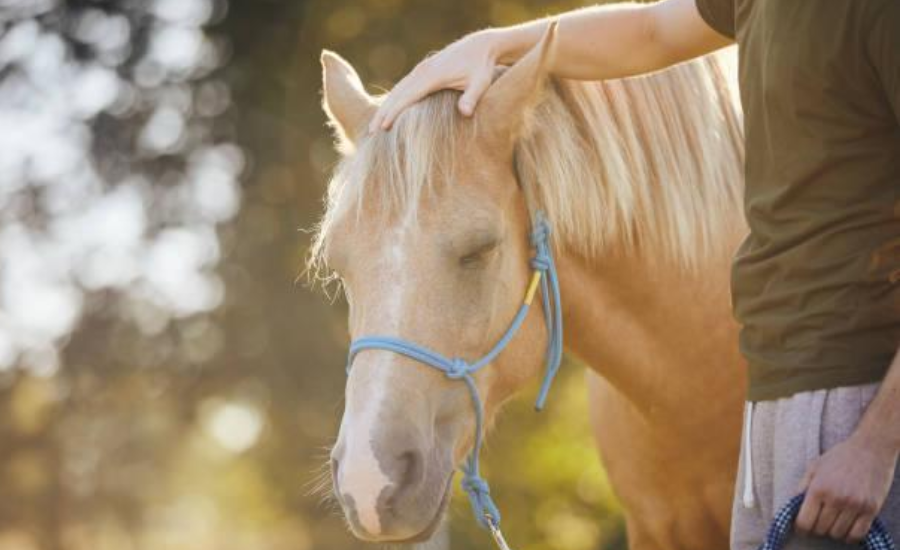
Dealing with trauma and equine therapy can be an incredibly isolating and challenging journey, but recovery is possible through various therapeutic methods. One of the more innovative and impactful approaches is equine therapy. This form of therapy, which involves working directly with horses, is gaining recognition for its profound impact on mental health, especially when addressing trauma. The unique bond formed between humans and horses can lead to deep emotional healing, helping individuals rebuild their lives after traumatic experiences.
In this blog, we’ll explore how trauma and equine therapy are interconnected, the benefits of using horses in trauma recovery, and why this method is becoming an increasingly popular choice for individuals seeking healing.
What is Equine Therapy?
Equine therapy, or horse-assisted therapy, involves therapeutic activities and interactions with horses, under the guidance of trained professionals, including therapists and equine specialists. The therapy focuses on non-verbal communication, mindfulness, trust, and building emotional connections with the horse.
What makes horses particularly effective in this kind of therapy is their sensitivity to human emotions. They can detect a person’s energy, feelings, and body language, often mirroring these emotions. For someone dealing with trauma, this feedback provides an opportunity for self-reflection and emotional processing in a safe, non-judgmental environment.
How Trauma and Equine Therapy Work Together
Trauma affects people in different ways. For many, it creates a deep sense of disconnection from their bodies, emotions, and the world around them. Traditional talk therapy may not always be enough to access these deep, often unspoken wounds. This is where equine therapy shines.
Horses require presence and authenticity. They mirror human emotions and can sense changes in the emotional state of the person they’re interacting with. In a therapy setting, this helps individuals struggling with trauma begin to reconnect with their feelings and become more present in the moment. The immediate and honest feedback from a horse can help individuals process their trauma in ways that words alone cannot achieve.
Benefits of Trauma and Equine Therapy
Engaging in trauma and equine therapy offers a range of emotional and psychological benefits. Here are some key ways in which this form of therapy can aid in trauma recovery:
1. Building Trust and Safety
Many individuals who have experienced trauma have difficulty trusting others, and understandably so. Trauma can shatter a person’s sense of safety, leaving them feeling vulnerable and alone. Horses, however, provide a unique opportunity for people to rebuild that trust. By working with a horse, individuals learn to trust again in a safe and controlled environment. Horses require clear communication, patience, and calmness, which encourages individuals to be honest with themselves and the animal. Over time, this process fosters a sense of safety and emotional security.
2. Non-Judgmental Presence
Horses offer a non-verbal, non-judgmental presence. This is essential for trauma and equine therapy recovery, as many individuals who have suffered trauma carry feelings of shame, guilt, or inadequacy. Interacting with a horse helps break down these emotional barriers because horses don’t judge—they simply respond to the energy and presence of the person before them. This can provide immense comfort and validation to individuals, allowing them to process their trauma without the fear of being criticized or misunderstood.
3. Mindfulness and Emotional Regulation
Trauma survivors often struggle with regulating their emotions and may feel overwhelmed by anxiety, anger, or sadness. Horses help individuals develop emotional regulation skills through their sensitive responses. If a person is anxious or fearful, the horse may become distant or react similarly, providing immediate feedback. To successfully work with the horse, individuals must learn to manage their emotions, remain calm, and be present. This practice of mindfulness is essential for healing and can significantly improve emotional regulation over time.
4. Rebuilding Confidence
Trauma often diminishes an individual’s self-esteem and sense of control over their life. Horses can help rebuild confidence by offering individuals small, meaningful achievements. Whether it’s leading a horse, grooming it, or successfully communicating with it, each interaction can provide a sense of accomplishment. This, in turn, builds self-confidence and helps individuals recognize their ability to overcome challenges and take control of their recovery journey.
5. Processing Deep Emotions
Because trauma is often stored in the body, talk therapy alone may not be enough to access these deep, often unconscious emotions. Equine therapy creates a physical and emotional experience that encourages individuals to confront and release stored trauma. The physical interaction with the horse, combined with the emotional bond formed during therapy, can unlock feelings and memories that have been suppressed. This experiential process is key to true healing.
Why Horses?
Horses are intuitive creatures that thrive on non-verbal communication. They are prey animals, meaning they are highly attuned to their surroundings and can sense danger or changes in energy. This sensitivity allows them to pick up on human emotions and respond accordingly.
Unlike other animals, horses are particularly skilled at reading body language and emotions. Their large size may seem intimidating at first, but it is this very size and power that makes the bond between human and horse so meaningful. Interacting with a horse can evoke feelings of empowerment, especially for those who may feel powerless due to their trauma.
Additionally, horses live in the present moment. They don’t carry judgments or assumptions, making them ideal companions for individuals working through past trauma. Their ability to live in the “now” encourages trauma survivors to do the same, shifting their focus from the past to the present, which is essential for healing.
What to Expect in an Equine Therapy Session
A typical equine therapy session doesn’t involve riding horses but focuses on activities like grooming, leading, and interacting with them from the ground. These seemingly simple tasks help individuals develop self-awareness, emotional regulation, and trust.
During a session, therapists will guide the individual through various exercises that promote emotional growth. They may ask the person to notice how the horse reacts to their presence, what feelings come up during the interaction, and how they can apply those experiences to their daily life. This reflective process helps individuals gain insight into their trauma and their healing process.
Who Can Benefit from Trauma and Equine Therapy?
Trauma and equine therapy can benefit a wide range of individuals. It is particularly useful for those who:
Have experienced physical or emotional trauma
Struggle with PTSD, anxiety, or depression
Feel disconnected from their emotions or body
Have difficulty trusting others
Want a non-traditional, experiential approach to therapy
Equine therapy can also be used in conjunction with other forms of therapy, such as talk therapy, cognitive-behavioral therapy, or EMDR (Eye Movement Desensitization and Reprocessing). Together, these therapies can create a comprehensive treatment plan that addresses both the emotional and physical aspects of trauma.
FAQs about Trauma and Equine Therapy
Q1. What is equine therapy?
A. Equine therapy is a form of experiential therapy where individuals work with horses to promote emotional healing and growth. It is particularly effective in trauma recovery, as horses help individuals develop trust, emotional regulation, and self-awareness.
Q2. How does equine therapy help with trauma?
A. Horses are highly intuitive animals that can sense and respond to human emotions. By interacting with horses, individuals can process deep emotions, build trust, and develop emotional regulation skills, which are essential for trauma recovery.
Q3. Do I need experience with horses to participate in equine therapy?
A. No, prior experience with horses is not necessary. Equine therapy sessions are led by trained professionals who guide individuals through safe and meaningful interactions with the horses.
Q4. Can equine therapy be combined with other forms of therapy?
A. Yes, equine therapy is often used in conjunction with other therapies such as talk therapy or cognitive-behavioral therapy. This creates a more holistic approach to trauma recovery, addressing both emotional and physical aspects of healing.
Q5. How long does it take to see results from equine therapy?
A. The timeline for results varies depending on the individual and the severity of the trauma. Some individuals may experience breakthroughs after a few sessions, while others may require longer engagement to see significant progress.
Conclusion
Trauma and equine therapy offer a powerful, experiential approach to healing that traditional therapies may not fully provide. By engaging with horses, individuals who have experienced trauma can rebuild trust, process deep emotions, and develop essential skills for emotional regulation. The unique bond formed with these gentle creatures allows for a non-verbal, non-judgmental form of therapy that speaks directly to the heart and soul. If you or someone you know is dealing with trauma, equine therapy may be the path toward recovery that you’ve been searching for.
Stay In Touch For More Updates And Alerts: Buzz Tele Cast



